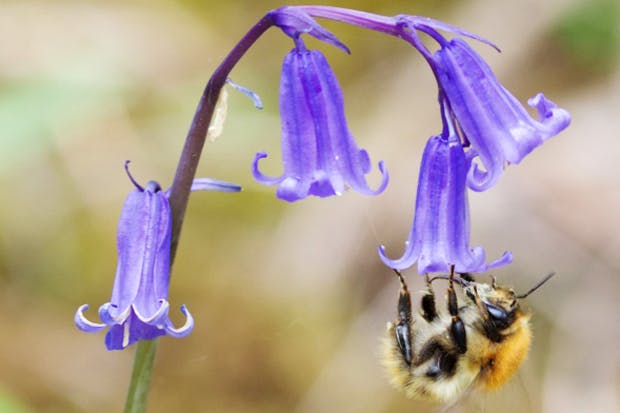From reading the newspapers you might get the impression that honeybees were on the way to extinction. In Europe, it is said, the number of honeybee colonies has fallen in a few years by a quarter. In the United States, it has halved since the 1940s. Nobody knows exactly why. The experts blame any number of things, from pesticides to climate change, from disease-bearing parasites to the loss of those plants on which bees like to feed. They all agree, however, that the disappearance of the bee would be a disaster. Bees don’t just make honey and beeswax. Eighty per cent of all plant species depend on them for pollination. One third of all the food that people eat would not be available but for bees.
Worrying though all that sounds, I am reassured by the fact that there always seem to be plenty of bees buzzing about in my garden in Northamptonshire; and when I arrived there from London for the Bank Holiday weekend, I found a note from my cleaner on the kitchen table warning me to be careful because there was a swarm of bees in the garden outside. And so it turned out to be, for there was a large, pulsating cluster of I don’t know how many thousands of the little insects attached to a wall on the far side of the lawn.
There are certain experiences in life that you never forget, and one such for me was when, as a little boy of seven or eight, living in the country in Hertfordshire, I walked into a swarm in flight and got repeatedly stung in my head as dozens of bees got caught up in my hair. I ran screaming back to the house; and while I can no longer remember what happened after that, or how long it took me to recover from the stings, it had a traumatic effect and left me always wary of bees thereafter. So I gave this latest swarm a wide berth and retreated indoors, only to find a short time afterwards that the bees had been closing in on me. The swarm had somehow crossed the lawn and reformed itself on the wall of my house immediately below my bedroom window.
At this point I consulted the farmer, who said he would call a local beekeeper to ask him to remove the swarm. After a short while two men wearing spacesuits arrived to carry out this daunting task. I did not see what they did as I was skulking indoors. But they later reported that, while they had trapped and removed the bulk of the swarm, quite a number of bees remained at large, and that they, the men in spacesuits, would return next morning with a hive containing a new queen bee that would attract the rest of them inside, and that they would come back the following evening and remove the hive.
Next morning I awoke feeling rather hot in bed, so I got up to open my bedroom window. No sooner had I got back into bed than bees started pouring in through the open window. So, at grave risk to my health and safety, I leapt out again to shut the window. I achieved this without mishap, but within a few minutes I found that all the bees that had come into the room had expired: there were at least a dozen of them lying dead on the floor. I cannot imagine why they had died, or why so quickly. The air in my bedroom is perfectly salubrious — hardly less so, I’d have thought, than the air in the garden outside. But it was as if the bees had just entered a gas chamber. Next time, instead of bothering local beekeepers, I will invite the entire swarm indoors.
Anyway, the beekeepers accomplished their mission and removed the hive without leaving a single bee behind. The garden is temporarily bee-free, but I expect it won’t be for long. For despite their rapidly declining numbers everywhere else in the world, bees seem to rather like it here. Knowing almost nothing about bees, I don’t know why. Perhaps it’s because there are a lot of cowslips in my garden, grown from plants given me by my late mother-in-law. ‘Where the bee sucks, there suck I,’ sang Ariel in The Tempest, ‘in a cowslip’s bell I lie.’
Got something to add? Join the discussion and comment below.
Get 10 issues for just $10
Subscribe to The Spectator Australia today for the next 10 magazine issues, plus full online access, for just $10.














Comments
Don't miss out
Join the conversation with other Spectator Australia readers. Subscribe to leave a comment.
SUBSCRIBEAlready a subscriber? Log in